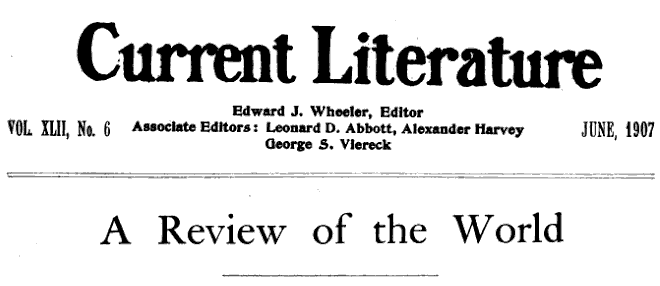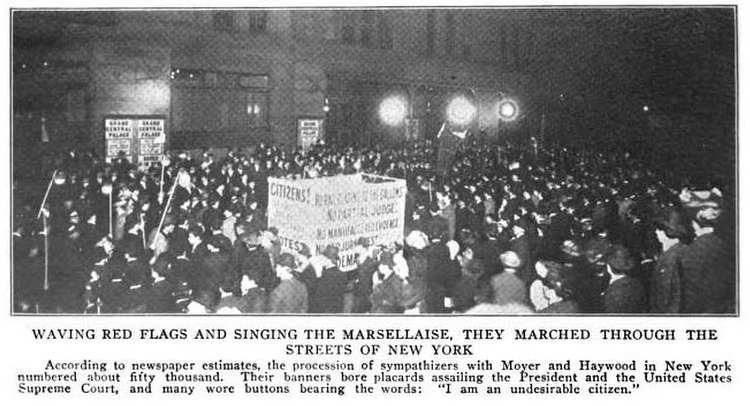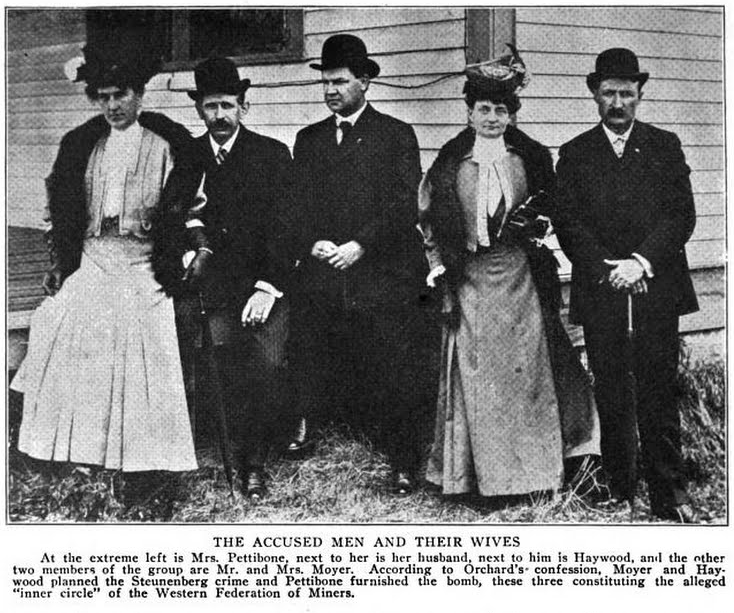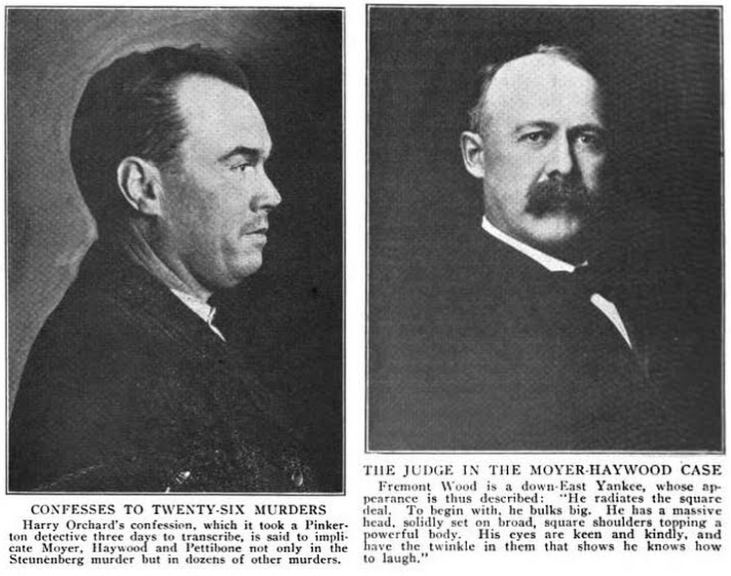If they hang Moyer and Haywood,
they’ve got to hang me.
-Eugene Victor Debs
Hellraisers Journal, Friday June 7, 1907
Current Literature on Moyer-Haywood-Pettibone Case, Part I
—–
WHAT Mr. Debs, once a Socialist candidate for President, calls “the greatest legal battle in American history,” is now in progress in Boise City, Idaho. Fifty special correspondents of newspapers and magazines from all parts of the country hastened last month to the little city to report the case, and the telegraph company installed ten additional circuits to handle the press of business. Boise City itself is not excited. It has not furnished any of the defendants, nor any of the lawyers, nor the victim whose murder is the cause of all this excitement. All it furnishes is the jury to try the case. But the country at large is furnishing the excitement. The President of the United States has been involved in a heated controversy over the character of the defendants. The United States Supreme Court has rendered a decision which is likened by Socialist orators to the Dred Scott decision of half a century ago. Thousands of men have been parading the streets of many cities—50,000 in New York alone according to The Herald’s estimate—waving red flags, singing the Marsellaise, denouncing the Supreme Court and assailing the President in terms of bitter reproach. And a collection of $250,000, according to some estimates, has been gathered from the members of labor unions to insure for the defendants in this trial an adequate defense.
—–
WHEN Frank Steunenberg, ex-Governor of Idaho, walked composedly toward his home in Caldwell, on Christmas eve seventeen months ago, chatting with two friends, three men were lying in wait near his gate, with sawed-off shotguns, ready to shoot him dead. When they saw his companions they cursed their luck and waited for a better chance. Six days later, December 30, 1905, the ex-Governor walked home again and laid his hand upon the familiar gate. It was his last act. The gate was a traitor. To it had been tied a piece of fish line, one end of which was attached to a bomb, which exploded as the gate started to swing open, and a few seconds later startled friends found Steunenberg lying at the point of death, almost torn limb from limb. Immediate steps were taken to apprehend the murderers. A patrol was established around the town of Caldwell by Governor Gooding, who hastened to the scene by a special train. No one was permitted to enter or leave without giving a satisfactory account of himself. Two suspicious characters who could not explain their presence satisfactorily were arrested. One gave his name as Harry Orchard, the other as Steve Adams. A third man, their confederate, got away and has never been found.
—–
TEN thousand dollars reward was offered by Governor Gooding for the arrest and conviction of the criminals. The Steunenberg family offered five thousand more. The large sums aroused the interest of the Pinkerton Detective Agency, and one of its managers, James McPartland [McParland], came from New York to take charge of the work. McPartland is sixty-seven years of age, and has a history that might make Sherlock Holmes turn green with jealousy. It was he who, by months of arduous labor, unearthed the evidence that broke up the famous Molly Maguire league in Pennsylvania a generation ago. By his order Orchard was placed in solitary confinement. None of the guards was allowed to speak with him. As the days passed by this enforced silence grew almost unbearable. Suddenly he was ad dressed by McPartland: “What will that old mother of yours think when she reads of you in this fix?” Orchard jumped to his feet startled, and wanted to know how the detective knew anything about his mother. McPartland talked to him about his home and his child hood. Orchard finally broke down and said he was ready to make a confession. It took McPartland three days to take it down on paper. Some account of its nature was given to the newspapers, and this indicates that it is sensational in the extreme. According to this account Orchard confessed to twenty-six deliberate murders, all of them, according to him, planned by an inner circle of the Western Federation of Miners and executed by himself and others. From Steve Adams, his supposed accomplice, another confession was obtained. Adams afterwards, according to a relative, asserted that this confession was false and had been secured from him by compulsion. To what extent corroboration for either or both these confessions has been obtained and can be produced in court can be seen only as the trial develops. The fate of the defendants depends upon the corroborative evidence, not upon the confessions. That is the law.
—–
THREE men were implicated by Orchard as principal agents in these murders. One of them is William D. Haywood, secretary of the Western Federation of Miners, “a big sturdy fellow with a square head and solid jaw,” who has lost one eye and overworks the other in much reading of socialistic and idealistic literature. A second is Charles H. Moyer, president of the same Federation, who has the reputation, according to one newspaper correspondent, of being the best man on his feet, making a speech, in the ranks of organized labor to-day. The third is George A. Pettibone, one of the members of the executive committee of the Federation [not true, Pettibone is not a member of the W. F. of M.], “a slight man, below the average height, with a weak chin and the good-natured grin that goes with it.” If Orchard’s reputed confession is to be trusted, these three men, and especially Haywood and Moyer, have been responsible for dozens of murders extending over a series of years in Colorado, Idaho and other states. All three were living in Denver, Col., when Steunenberg was killed, and the first move necessary to bring them to trial was to have them extradited and brought to Idaho. And here comes in a proceeding on the part of the authorities that every Socialist paper in the country has been denouncing as a case of “kidnapping,” and which has been severely criticized by a number of papers not of the Socialist persuasion, and by one member—Judge McKenna—of the United States Supreme Court.
—–
IDAHO officials proceeded to Denver and presented to Governor McDonald their evidence against Moyer, Haywood and Pettibone, and a request from Governor Gooding for their extradition. Now, “the foundation of extraditing between the states,” to quote Justice McKenna, “is that the accused should be a fugitive from justice from the demanding state, and he may challenge the fact by habeas corpus immediately upon his arrest.” The Idaho officials swore, apparently, that these three men were fugitives from Idaho, and the Governor of Colorado thereupon granted the request for extradition. That was in the middle of the week. The officials waited until Saturday, February 17, and then arrested the men after court hours, kept them secreted in jail all night, and early the next morning took them aboard a special train and made all haste into Idaho. This was the proceeding that has created such fervent indignation in the columns of the Socialist press and for which no other form of justification has been advanced, so far as we have seen, except that the end in this case justified the means. Six days later the attorneys of the imprisoned men applied to the Supreme Court of Idaho asking for a writ of habeas corpus to test the validity of the imprisonment. It was refused. A few days later the petition for such a writ was made to the United States Circuit Court of Idaho. It was again denied. An appeal was made to the United States Supreme Court. On December 3 last the Supreme Court sustained the decision of the Circuit Court, denying the petition.
—–
THIS decision of the Supreme Court is not, however, to the effect that the method of securing extradition was regular or justified, but simply that, however hasty or inconsiderate it may “have been, it did not come into the category of violations of the federal laws or the federal constitution. The language of the court is:
Even if it be true that the arrest and deportation of Pettibone, Moyer and Haywood from Colorado was by fraud and connivance, in which the Governor of Colorado was a party, this does not make out a case of violation of the right of the appellants under the constitution and laws of the United States….In the present case it is not necessary to go behind the indictment and inquire as to how it happened that he came within reach of the process of the Idaho court, in which the indictment is pending, and any investigation as to the motives which induced action by the governors of Idaho and Colorado would be improper as well as irrelevant as to the real question to be now determined.
It must be conclusively presumed that those officers proceeded throughout this affair with no evil purpose and with no other motive than to enforce the law. The decision of the lower courts is therefore affirmed.
From this decision Justice McKenna alone dissented. In his opinion he said:
Kidnapping is a crime, pure and simple. It is difficult to accomplish, hazardous at every step. All officers of the law are supposed to be on guard against it. But how is it when the law becomes the kidnapper? When the officers of the law, using its forms and exerting its power, become abductors? This is not a distinction without a difference. It is another form of the crime of kidnapping distinguished from that committed by an individual only by circumstances….
No individual could have accomplished what the power of the two states accomplished. No individual could have commanded the means of success; could have made two arrests of prominent citizens by invading their homes; could have commanded the resources of jails, armed guards and special trains; could have successfully timed all acts to prevent inquiry and judicial interference.
The accused, as soon as he could have done so, submitted his rights to the consideration of a federal court. He could not have done so in Colorado. He could not have done so on the way from Colorado. At the first instant that the State of Idaho relaxed its restraining power, he invoked the aid of habeas corpus.
He should have been heard, not dismissed from court, and the action of the circuit court in so doing should be reversed.
—–
THE interest of the Socialists in this matter is readily explained. The Western Federation of Miners is the one large labor organization in this country that has placed itself upon an out-and-out Socialist platform. Haywood himself, after his arrest and during his incarceration, was made the Socialist candidate for governor of Colorado, conducting his campaign from the prison in Caldwell, Idaho, and receiving 16,192 votes. As he is likely to be a prominent figure before the country for some weeks, the temper of the man, as manifested in his letter of acceptance, is of interest. Here is a passage from that letter:
So far has the Supreme Court of Colorado sunk below the level of common decency, a windlass will be required to hoist them into the presence of his Satanic Majesty. Under the black robes of iniquity Beelzebub will recognize the prototypes of Iscariot and Arnold; the live “King’s Bench” advocates are distinguished by the traitor’s symbol.
So coarse, so flagrant is the last fell decision of the Supreme Court that the dilettante politicians are aroused ; sitting on their haunches, they are howling like a pack of mangy coyotes; their dwarfed mentalities are unable to discern the cause of the corruption in the Supreme Court, which is a boil on the body politic; it needs lancing and a strong poultice of Socialism; the suppuration is the natural result of a diseased system. Eliminate the virus of profit, interest and rent from the industrial arteries of the state, and the commonwealth will no longer suffer the soul-racking tortures, the effect of capitalism.
As for Mover, the Pinkertons declare that they have absolute proof that, before he be came president of the Federation, he had served a term in the Joliet prison, Illinois, for a series of burglaries committed on the west side, Chicago. This is denied emphatically by Moyer and his counsel…..
[Photograph of New York Protest moved from 2nd page to start of article.]
The second and final part of this article will be found in tomorrow’s edition of Hellraisers Journal.
SOURCE & IMAGES
Current Literature, Volume 42
-ed by Edward J Wheeler
-Jan-June 1907
(New York, New York)
Current Literature Publishing Company, 1907
https://books.google.com/books?id=f0lWAAAAYAAJ
CL June 1907
“Review of the World”
re: Haywood Trial in Boise, events leading up to trial, TR Roosevelt & “Undesirable Citizen” controversy.
https://play.google.com/books/reader?id=f0lWAAAAYAAJ&printsec=frontcover&pg=GBS.PA587
See also:
For more on Current Literature:
https://en.wikipedia.org/wiki/Current_Literature
The Molly Maguires
–from Richard O. Boyer and Herbert M. Morais, Labor’s Untold Story.
United Electrical, Radio and Machine Workers of America,
Pittsburgh, PA, 1955, pp. 43-58.
https://msuweb.montclair.edu/~furrg/i2l/mollymaguires.html
Note: George Pettibone was a former officer of the Gem Miners Union, and took part in the Coeur d’Alene troubles of 1892. That struggle came before the founding of the Western Federation of Miners.
http://moses.law.umn.edu/darrow/documents/George_Pettibone_Miner_s_Magazine_1900.pdf
For more of McKenna’s Dissenting Opinion
-from Emma F Langdon’s coverage of Haywood Case:
http://www.rebelgraphics.org/wfmhall/langdon29.html#mckennasdissentingopinion
For more on Moyer at Joliet Pen:
Big Trouble:
A Murder in a Small Western Town…
– by J. Anthony Lukas
Simon and Schuster, Jul 17, 2012
(search: “charles moyer” joliet)
https://books.google.com/books?id=d07IME-ezzQC
Solidarity: Paul Robeson and the Welsh Miners




